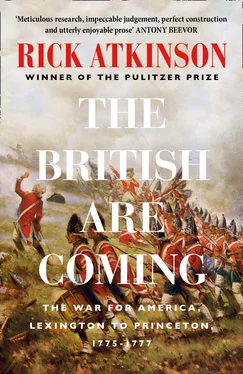Freeholders gathered for meetings, as usual, in Faneuil Hall. The town agreed to borrow £600 to buy grain for the almshouse poor. A report in late March noted that thirty-eight smallpox patients were quarantined on a hospital scow in the Charles River, “some distance from the wharf.” Freeholders voted to continue a recent ban on inoculation; many now feared that it posed a greater risk of epidemic than natural infection. Any household with sick inhabitants was required to display a large red flag on a six-foot pole or incur a £50 fine. For those intent on inoculation, newspapers advertised the services of a private hospital in New York.
Friction between patriots and loyalists intensified. Hundreds of Tories, as they often were called with a sneer, arrived from the provinces to seek the king’s protection in Boston. The “once happy town” was now “a cage for every unclean bird,” in Mrs. Samuel Adams’s estimation. “Humbling the Tories” had become a blood sport in Massachusetts Bay, with excrement smeared on houses or dumped through open windows, with severed sheep’s heads tossed into open chaises, or with loyalists locked in smokehouses—the chimney flues obstructed—until they renounced the Crown. A tavern keeper in South Danvers was forced to recite in public, “I, Isaac Wilson, a Tory I be, / I, Isaac Wilson, I sells tea.” A radical Presbyterian cleric thanked God from the pulpit for “sufficient hemp in the colonies to hang all the Tories,” while a loyalist woman hoped someday soon to be riding through rebel blood to the hubs of her carriage wheels. Small wonder that a Falmouth minister believed the colony was suffering “a discontent bordering on madness.”
A Calvinist people marinated in the doctrine of predestination braced for the inevitable, and preparations for war continued apace. Clandestine military cargo had arrived all winter from Hamburg, Holland, even London, smuggled through a hundred coves and stored in a thousand barns. The Simsbury Iron Works in Connecticut cast cannonballs. Salem women secretly cut and stitched five thousand flannel powder cartridges for field guns. The provincial congress, meeting first in Cambridge and then in Concord, ordered enough military stores amassed for fifteen thousand militiamen: canteens, bell tents, field tents, Russian linen, wooden spoons. By April, the provincial stockpile included 21,549 firelocks, nine tons of gunpowder, eleven tons of cannonballs, ten thousand bayonets, 145,000 flints. Fifteen medicine chests, purchased for £500 from Boston apothecaries, contained opium, liquid laudanum, emetics, mercurial ointments, tourniquets, and a trepan for boring holes in a skull to relieve pressure from an injured brain. Dr. Warren would distribute the chests among seven towns by mid-April, including two sent to Concord.
Farm carts hauled ammunition and powder kegs down country lanes, to be hidden in attics or buried in new-plowed furrows, along with those radish and onion seeds. British soldiers searching a countryman’s wagon in mid-March seized more than a ton of musket balls and over thirteen thousand musket cartridges stacked in candle boxes; the teamster insisted that the munitions were for his private use. But most shipments went undiscovered. In Concord a militia colonel, James Barrett, listed more than three dozen caches in his notebooks—including rice, ammunition, axes, oatmeal, and wood-bladed shovels rimmed with iron shoes. As ordered by the provincial Committee of Supply, he appointed “faithful men” to guard the stocks, with teams ready “by day and night, on the shortest notice” to haul the matériel away as required.
The provincial congress also chose five militia generals and approved a system for alerting the colony with mounted couriers in moments of peril. Several dozen articles of war were adopted; the first two required soldiers to attend church and to avoid profane oaths, with a fine of four shillings per cuss for officers, less for privates. Virtually every white male from sixteen to sixty in Massachusetts was required to serve under arms. “The parson as well as the squire stands in the ranks with a firelock,” a Boston merchant wrote. Instead of exercising once every three months, many companies now met three times a week. An Essex County militia colonel, Timothy Pickering, simplified the manual of arms with his Easy Plan of Discipline for a Militia , which would be widely adopted. Muskets could be primed and loaded with one order and ten motions. “Lean the cheek against the butt of the firelock,” the Easy Plan instructed. “Shut the left eye, and look with the right along the barrel.”
Each company elected its own officers, but at a militia gathering in March, Reverend Emerson drew from the Second Book of Chronicles to remind the men of Concord who really led them: “Behold, God himself is with us for our captain.”
Boston’s natural beauty had once beguiled British soldiers. “The entrance to the harbor, and the view of the town of Boston from it, is the most charming thing I ever saw,” an officer wrote home in 1774. That enchantment had faded by the spring of 1775. “No such thing as a play house,” a lieutenant in the 23rd Foot complained. “They [are] too puritanical to admit such lewd diversions, though there’s perhaps no town of its size could turn out more whores than this could.” A captain in the 38th Foot told his brother in Ireland, “The people here and we are on bad terms, ready to cut one another’s throats.” Small insults bred seething resentments. All it took was an overbearing British customs official, mud flung at a fusilier on the street, or a fistfight over a girl between a “Jonathan”—a rebellious American, in British slang—and a lobstercoat.
A Royal Navy officer described seeing miniature effigies of British soldiers hanging by nooses from roadside trees, each wearing a tiny red coat. In March, a marine lieutenant reported how passing Bostonians made coarse gestures with their hands on their backsides. For their part, devout colonists resented regulars dishonoring the Sabbath by ice-skating across a Roxbury pond; they also loathed British Army profanity, which dated at least to the Hundred Years’ War, when English bowmen were known as “Goddams.” Major John Pitcairn, the marine commander in Boston, advised the Admiralty in March, “One active campaign, a smart action, and burning two or three of their towns, will set everything to rights. Nothing now, I am convinced, but this will ever convince these foolish bad people that England is in earnest.”
The British garrison now exceeded five thousand, of whom more than four-fifths were soldiers, gunners, and marines in thirteen regiments. They crowded every corner of the town: artillerymen billeted in warehouses on Griffin’s Wharf, the 4th Regiment of Foot—known as the King’s Own—in a vacant distillery in West Boston, the 64th Foot in Castle William on a harbor island, the 43rd Foot on Back Street. Troops drilled in Brattle Square and on the Common, throwing stones to drive away the cows and avoiding the burial ground that held the graves of a hundred comrades dead from disease and mischance. Regiments took target practice on the wharves, six to ten rounds for each soldier, firing at river flotsam or at man-size figures cut from thin boards. A physician visiting from Virginia told his diary of watching light infantry exercises in late March, “young active fellows” who loaded firelocks while lying on their backs, then flipped over to fire from their bellies. “They run out in parties on the wings of the regiment,” he added. “They secure their retreat & defend their front while they are forming.”
Ugly encounters between Jonathans and lobstercoats multiplied. Officers mocked the Old South oration with a parody delivered from a coffeehouse balcony in “the most vile, profane, blackguard language,” a witness reported. In mid-March, soldiers from the King’s Own pitched tents within ten yards of a meetinghouse and played drums and fifes throughout the worship service; troops later vandalized John Hancock’s elegant house facing the Common. A peddler from Billerica named Thomas Ditson, Jr., who was accused by British soldiers of trying to buy old uniforms and a musket from the 47th Regiment, was stripped, tarred, feathered, and paraded from Foster’s Wharf through King Street while a fifer played “The Rogue’s March.” A placard labeled “AMERICAN LIBERTY” was draped around his neck. “It gave great offense to the people of the town,” a British officer wrote, “and was much disapproved of by General Gage.”
Читать дальше












